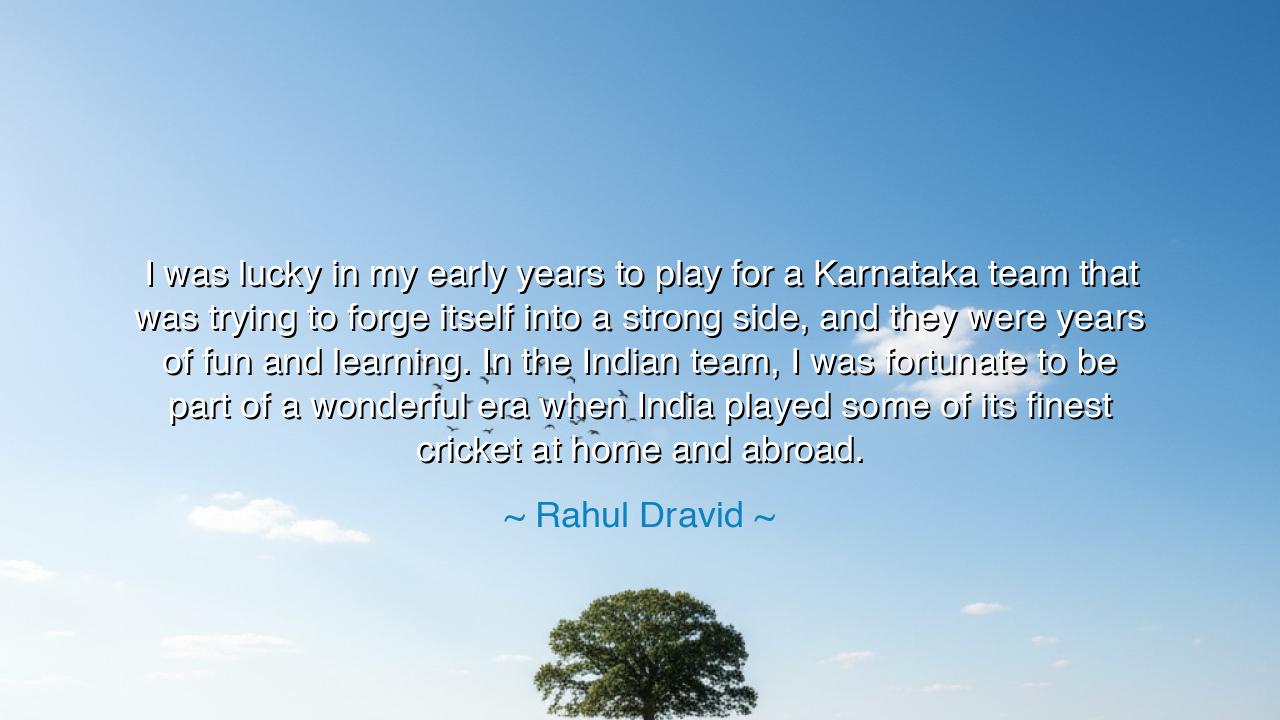
I was lucky in my early years to play for a Karnataka team that
I was lucky in my early years to play for a Karnataka team that was trying to forge itself into a strong side, and they were years of fun and learning. In the Indian team, I was fortunate to be part of a wonderful era when India played some of its finest cricket at home and abroad.






In a voice tempered like steel in a morning forge, Rahul Dravid reflects: “I was lucky in my early years to play for a Karnataka team that was trying to forge itself into a strong side, and they were years of fun and learning. In the Indian team, I was fortunate to be part of a wonderful era when India played some of its finest cricket at home and abroad.” Within this soft-spoken confession lies a whole catechism of craft: that greatness is not a solo pilgrimage but a caravan; that luck meets the prepared soul; that the fires which harden character are communal, not solitary. He names the two altars of his making—state and nation—and bows to both with gratitude.
To be lucky in the early years is to have one’s first footprints fall on good soil. The apprentice needs a workshop where the hammer’s rhythm is steady and the elders’ eyes are kind but exacting. In Karnataka, Dravid found compatriots who were themselves being forged—a furnace of peers, coaches, and captains who made correction feel like camaraderie and discipline feel like delight. Such beginnings teach the oldest rule: talent grows tall when it stands shoulder to shoulder; it grows crooked when it stands alone.
He calls those years “fun and learning,” joining joy to rigor as two strands of the same rope. The ancients would approve. For no athlete—no artisan of any field—can endure on austerity alone. Laughter oils the hinges of long practice; shared meals reconcile hard days; dressing-room stories become sutures that hold a team together when scoreboards turn hostile. In that merriment, a deeper seriousness is born: the willingness to turn up early, to leave late, to do again what failed yesterday until it sings today.
Then came the second sanctum: the Indian team, and with it an era when the nation’s cricket shook off its hesitations and walked with a straighter back both at home and abroad. Here the individual found his place in a larger choir. Styles varied—flair and grind, wrist and wall—but the song was one. Dravid’s humility frames this not as destiny but as fortune: to be present when the river crested, to contribute not as a comet but as a constant star.
Consider a lamp lifted from that age. At Adelaide in 2003, chasing a first overseas series win in a generation, Dravid carved a monumental 233 in the first innings and returned with an unbeaten 72 in the fourth. It was not merely the sum of runs; it was a sermon on method under heat—leaving with conviction, driving with conscience, wearing the day’s fatigue like armor. That match stands as parable: the finest cricket is birthed when personal resolve marries collective belief, and when the steady hand steadies the whole side.
The meaning of his words, then, is twofold: first, that learning ripens best inside a culture intent on becoming; second, that the height of a career is often the harmony of a generation. The forge is the team, the bellows are the mentors, the spark is the shared hunger—and the blade that emerges is not one champion alone but a cohort able to cut through doubt in foreign light and domestic glare alike. He names this with the modesty of a craftsman who knows that even the sharpest edge remembers the smiths who shaped it.
What is the lesson for us who may never raise a bat before a crowd? Seek your Karnataka—a place where people are building, not merely basking. Choose circles that correct with care and celebrate with sincerity. Bind fun to learning so that endurance has joy to drink. In your work, be the teammate who lengthens others’ focus; in your life, be the anchor who steadies the chase. And when your own era arrives—those rare seasons when purpose, people, and possibility align—receive it like Dravid: with gratitude, with discipline, and with the quiet vow to turn luck into legacy, and legacy into service.






AAdministratorAdministrator
Welcome, honored guests. Please leave a comment, we will respond soon